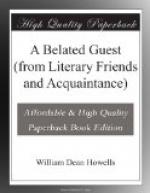The first year of his Eastern sojourn was salaried in a sum which took the souls of all his young contemporaries with wonder, if no baser passion, in the days when dollars were of so much farther flight than now, but its net result in a literary return to his publishers was one story and two or three poems. They had not profited much by his book, which, it will doubtless amaze a time of fifty thousand editions selling before their publication, to learn had sold only thirty-five hundred in the sixth month of its career, as Harte himself,
“With sick and scornful looks averse,”
confided to his Cambridge host after his first interview with the Boston counting-room. It was the volume which contained “The Luck of Roaring Camp,” and the other early tales which made him a continental, and then an all but a world-wide fame. Stories that had been talked over, and laughed over, and cried over all up and down the land, that had been received with acclaim by criticism almost as boisterous as their popularity, and recognized as the promise of greater things than any done before in their kind, came to no more than this pitiful figure over the booksellers’ counters. It argued much for the publishers that in spite of this stupefying result they were willing, they were eager, to pay him ten thousand dollars for whatever, however much or little, he chose to write in a year: Their offer was made in Boston, after some offers mortifyingly mean, and others insultingly vague, had been made in New York.
It was not his fault that their venture proved of such slight return in literary material. Harte was in the midst of new and alien conditions,—[See a corollary in M. Froude who visited the U.S. for a few months and then published a comprehensive analysis of the nation and its people. Twain’s rebuttal (Mr. Froude’s Progress) would have been ’a propos’ for Harte in Cambridge. D.W.]—and he had always his temperament against him, as well as the reluctant if not the niggard nature of his muse. He would no doubt have been only too glad to do more than he did for the money, but actually if not literally he could not do more. When it came to literature, all the gay improvidence of life forsook him, and he became a stern, rigorous, exacting self-master, who spared himself nothing to achieve the perfection at which he aimed. He was of the order of literary men like Goldsmith and De Quincey, and Sterne and Steele, in his relations with the outer world, but in his relations with the inner world he was one of the most duteous and exemplary citizens. There was nothing of his easy-going hilarity in that world; there he was of a Puritanic severity, and of a conscience that forgave him no pang. Other California writers have testified to the fidelity with which he did his work as editor. He made himself not merely the arbiter but the inspiration of his contributors, and in a region where literature had hardly yet replaced the wild sage-brush of frontier journalism, he made the sand-lots of San Francisco to blossom as the rose, and created a literary periodical of the first class on the borders of civilization.




